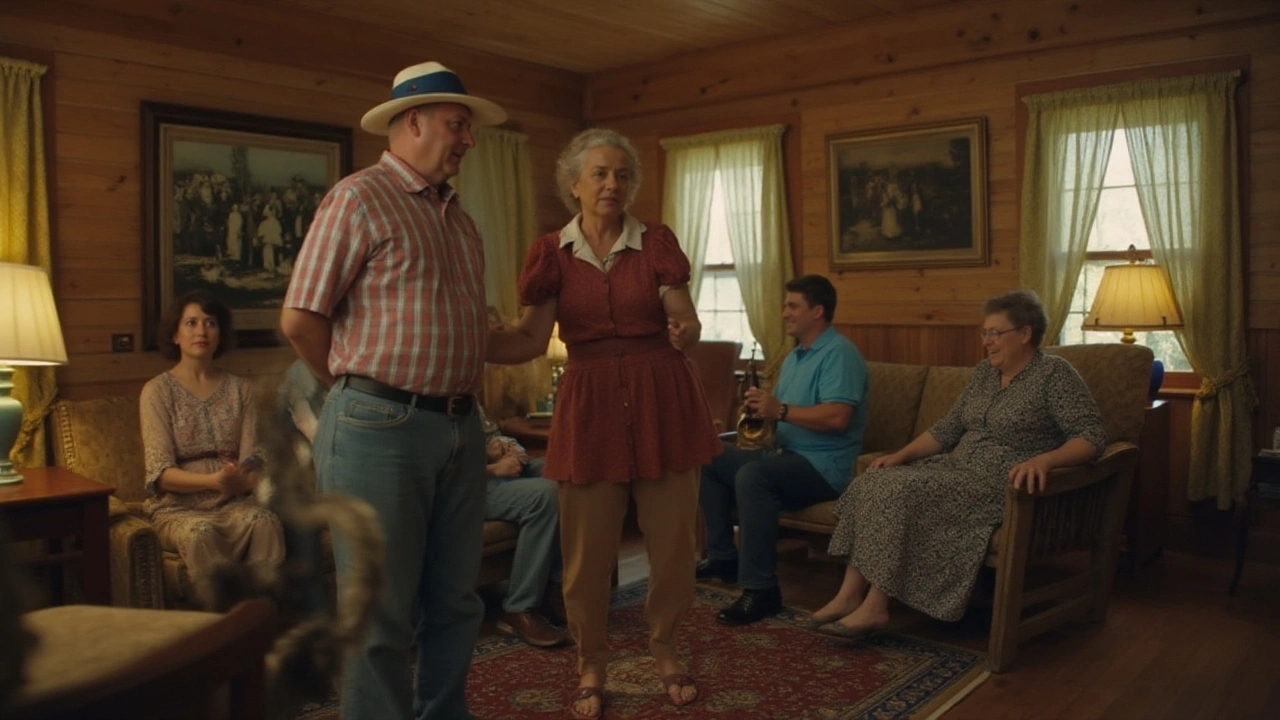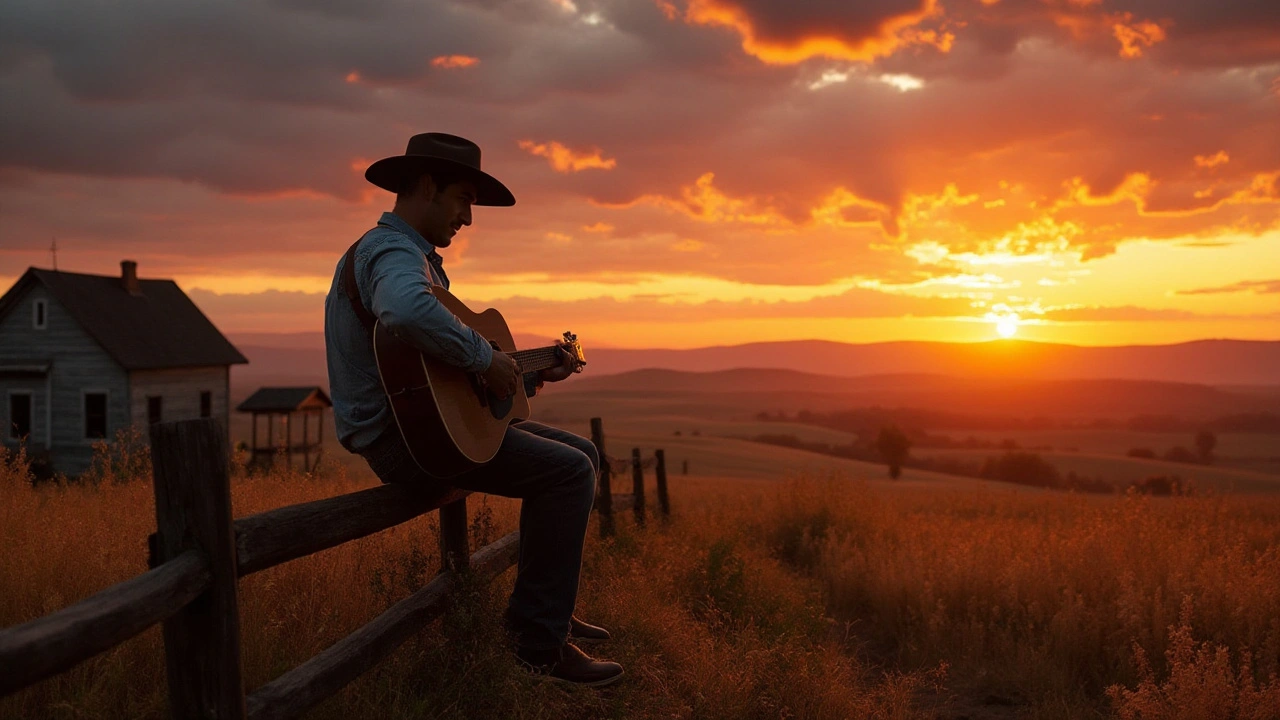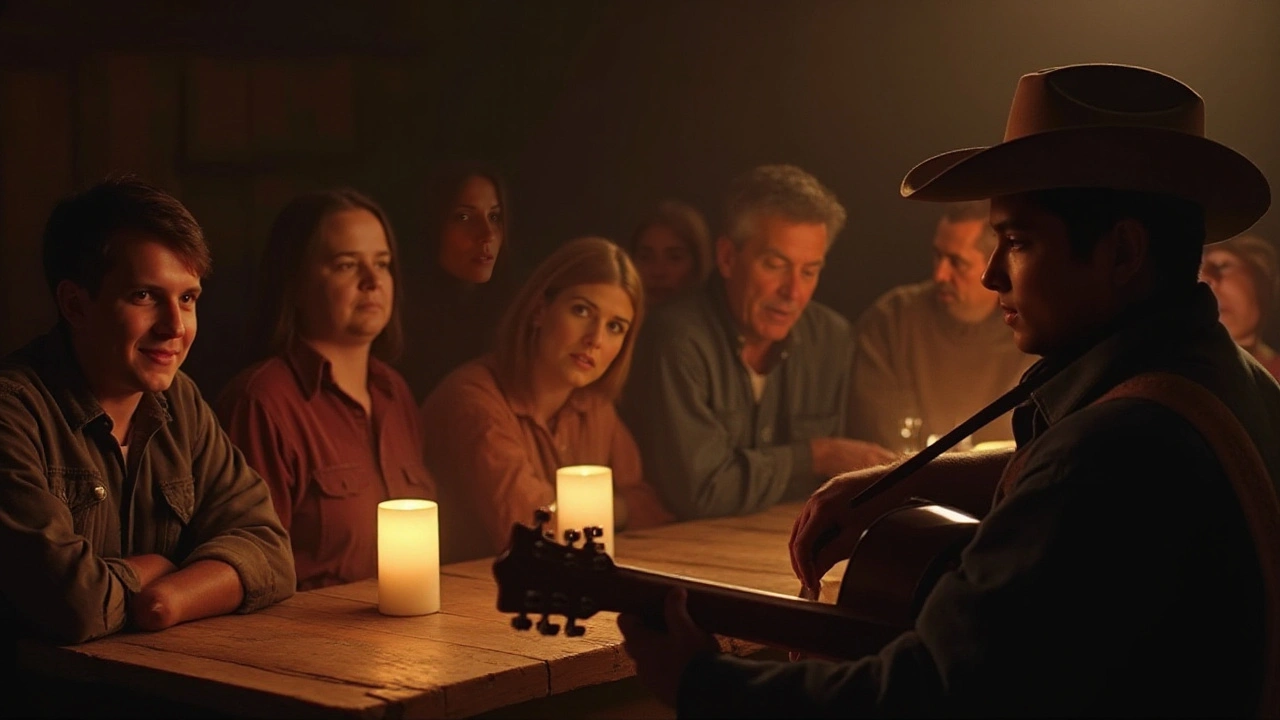Country music is known for its heartfelt storytelling and emotional depth, offering listeners a glimpse into the human experience with each strum of a guitar. It takes a special kind of song to draw tears and evoke a visceral response from an audience, and country ballads have that magic touch in abundance. These songs explore themes of love, loss, and the profound moments in life that leave us changed forever.
In this exploration of emotional country ballads, we journey through the essence of this captivating genre and uncover the timeless hits that have left an indelible mark on fans worldwide. Through the tales spun by legendary artists and the evolution of the genre itself, we will uncover the ingredients that make these ballads so unforgettable. Prepare to delve into the world of ballads built on heartfelt lyrics and moving melodies, as we unravel the secrets of their enduring appeal.
- The Essence of Country Ballads
- Iconic Artists and their Emotional Hits
- Historical Perspectives and Evolution
- Crafting a Heartfelt Ballad
- The Emotional Impact on Listeners
The Essence of Country Ballads
Country ballads stand as a rich fusion of storytelling and melody, crafting narratives that delve deep into the human soul. What sets these *emotional songs* apart is their ability to capture life’s raw, genuine emotions, translating them into a melody that speaks universally. These ballads often center on themes such as love, heartbreak, and redemption, drawing listeners into a world where each note resonates with relatable experiences. One might say that a good country ballad is akin to a slice of life, wrapped in layers of music that echo with warmth and sincerity.
In the heart of every great ballad lies its storytelling prowess. Country music artists have long been adept at weaving intricate tales that brim with emotional depth. From tales of unrequited love to sagas of enduring friendships, these narratives hold power because they speak truths we all know but might not always articulate. Many of these songs are rooted in personal experiences and shared cultural memories, lending them a timeless quality that listeners of every generation can appreciate.
Take, for example, the poignant imagery often found in country ballads, which paints vivid pictures of rural landscapes and intimate moments. It is this vivid imagery that allows listeners to place themselves within the song, experiencing the story as if it were their own. As the great Johnny Cash once said,
"I wear the black for the poor and the beaten down, living in the hopeless, hungry side of town."This quote exemplifies how country ballads use relatable scenarios to tug at the heartstrings, making listeners reflect on their own lives.
Country songs not only cover the introspective side of life but also celebrate its joyful moments. The balance between highlighting life’s beauty and acknowledging its challenges is what gives these songs such depth. They remind us that life is a mix of highs and lows, and in appreciating both, we find the richness of the experience. This balance is captured beautifully through tender lyrics and emotive melodies that stay with you long after the song has ended.
In understanding the essence of country ballads, it becomes clear that their enduring charm lies in their authenticity. These songs reflect genuine emotions, sung with a passion that resonates on a personal level. Artists pour their hearts into every chord and verse, with an authenticity that invites audiences to connect deeply with the music. Whether through a simple guitar riff or a powerful vocal delivery, country ballads continue to be a beloved genre, offering solace, joy, and understanding in equal measure.
Iconic Artists and their Emotional Hits
Country music has a rich history of producing artists who know how to reach into the depths of emotion and paint vivid pictures with their songs. These emotional songs often tell stories that reflect life's most poignant moments, and few genres capture the emotional journey of the heart quite like country music. From heartbreak to redemption, classic country ballads have long provided comfort and resonance to fans, and the artists behind them hold a special place in music history.
Dolly Parton is an artist whose storytelling prowess stands unmatched. Her song "Jolene" tells a story of desperation and vulnerability, a woman pleading with another not to steal her love away. The haunting melody and simple plea strike a chord that is immediately relatable. Then, there's "I Will Always Love You," a bittersweet farewell that became a classic since its release in 1973. When Whitney Houston covered it, the song became one of the best-selling singles of all time, proving its universal appeal.
Johnny Cash, with his deep, somber voice, also left an indelible mark with hits like "Hurt," which showcases the rawness of regret and the very visceral sense of a life lived with mistakes. Originally a Nine Inch Nails song, Cash’s rendition brought a deeper emotional weight that even Trent Reznor, the original writer, acknowledged. As Rolling Stone stated, "Cash owned the song."
"I wasn’t prepared for what I saw," Reznor mentioned about watching Cash's music video for the first time, illustrating the power of emotional storytelling in country music.
Then there is the timeless Willie Nelson whose gentle touch with "Blue Eyes Crying in the Rain" narrates the melancholy of lost love. It's a simple yet powerful ballad that has resonated with many over the years. Nelson's ability to convey emotion with simplicity is a hallmark of his career and a defining characteristic of country music's appeal.
In recent years, modern artists like Miranda Lambert have continued the tradition of delivering powerful country songs. Her hit "The House That Built Me" resonates with listeners by touching upon themes of childhood memories, growth, and nostalgia. Such songs remind us of home and the building blocks that make us who we are. Alan Jackson's "Remember When" is another that reflects on love and life, with lyrics taking listeners through a journey from youth to old age. These newer artists ensure the evolution yet preservation of the emotional storytelling that country music is beloved for.
Heartwarming stories and raw lyrics define these artists and their ballads, making their music an essential part of the country music landscape. They offer not only entertainment but also a companion in times of need, reflecting our shared human experience through the beautiful lens of music.

Historical Perspectives and Evolution
Country music, with its deep roots and rich traditions, has long been a soundtrack to the lives of many. To understand its emotional impact today, one must look back at its origins. Emerging from the folk tunes of immigrants in the Appalachian Mountains, the distinctive sound of country music began to take shape in the early 20th century. Artists blended European folk roots with African American blues elements, giving birth to a new genre driven by its heartfelt storytelling and soulful melodies. This music echoed the hopes, struggles, and dreams of rural America, connecting deeply with listeners through relatable themes.
As country music evolved, so too did its ability to tug at the heart. The 1950s marked an era where the Nashville sound began to dominate, smoothing rough edges with orchestral arrangements. Legends like Patsy Cline and Jim Reeves brought emotional ballads into the mainstream, captivating audiences with their haunting voices. A true revolutionary, Hank Williams Sr. captured universal emotions with songs like “I'm So Lonesome I Could Cry,” weaving tales of heartache and longing. His music laid the groundwork for future generations to mine personal sorrow as a source of artistic inspiration, paving the way for more complex emotional storytelling.
The genre went through significant transformations again in the 1970s with the rise of outlaw country. Artists like Willie Nelson and Waylon Jennings broke from tradition, embracing rawer sounds and rebellious themes. This period added another layer to the emotional depth of country ballads, as artists were freer to explore themes of personal pain and societal observation. The era's music resonated with authenticity, striking a chord with a new audience who found solace in their genuine expression. Such shifts illustrate the genre's adaptability and how its emotional resonance remains tuned to the times.
As the years went by, country music continued to evolve, embracing elements of pop, rock, and even hip-hop. Yet, the heart of country music remained unchanged. Its ballads continued to tell stories that stemmed from everyday life experiences. The 1990s and 2000s saw artists like Garth Brooks and Shania Twain merge mainstream sounds with traditional country storytelling, ensuring the genre's broad appeal. Emotional depth was never sacrificed, as illustrated when Brooks sang about reconnecting with lost love in “The Dance.” Such cross-genre appeals led to increased popularity and enduring legacy.
Recent years have seen a new wave of country artists who blend modern themes with traditional roots, keeping the heart of the genre alive. Singer-songwriters like Kacey Musgraves and Chris Stapleton carry the torch as they merge current social themes with time-worn emotional narratives. Their work demonstrates how country music, and its ballads, can change with the times without losing the emotional core that has always made country music so compelling. Whether it's a song about heartbreak, redemption, or the simple countryside life, the emotional roots remain steadfast, connecting people across time and borders.
Crafting a Heartfelt Ballad
The art of crafting a country ballad that resonates deeply with its listeners involves more than just melody and lyrics. It begins with understanding the core emotions that the song seeks to convey. These emotions can range from lost love and heartache to joy and nostalgia. Often, the best ballads are those that draw from real-life experiences, whether personal to the writer or universally relatable. At the heart of any successful ballad is an authentic emotional truth that strikes a chord with listeners.
The process usually kicks off with the lyrics, the backbone of any memorable ballad. A storyteller at heart, the songwriter weaves a narrative that unfolds like chapters in a book. Each line builds upon the last, leading the listener on an emotional journey. Imagery plays a critical role in these narratives, painting vivid pictures with words that linger in the mind long after the song has ended. For example, the opening line of a ballad might paint a scene of a dusty highway, framing the foundation for a tale of a journey not just through physical distance, but through the many emotions of a lifetime.
Melody and Chord Progressions
Once the lyrics shape the story, the melody is crafted to cradle those words, wrapping them in a tune that enhances the emotional impact. In many classic country ballads, the melody mirrors the simplicity and earnest charm characteristic of the genre. A few guitar strums can bring to life the aching loneliness or soaring joy expressed in the lyrics. Commonly used chord progressions in country music are I–IV–V and Nashville number system variations, offering a traditional yet versatile musical foundation.
"Songwriting is not about planning an emotion, it's about feeling it, then capturing it." - Dolly Parton
The instrumental arrangement bolsters the melody and lyrics, with traditional instruments like acoustic guitar, fiddle, and steel guitar adding the quintessential country flavor. These elements form a perfect blend that underscores the heartfelt nature of the song without overshadowing the storytelling. Crafting this perfect balance is akin to painting; each instrument contributes a brushstroke to the lush, emotional landscape of the ballad.
The Personal Connection
One of the reasons country ballads leave a lasting impression is their relatability. Successful songwriters often draw inspiration from personal experiences, while connecting those stories to broader, universal themes such as love and longing. True authenticity comes when the singer truly inhabits the story, delivering the lyrics not as mere words, but as felt emotions. It's this genuine connection that allows listeners to see their own stories reflected in the song, solidifying the ballad’s place in their hearts.
Prestige and success in crafting these ballads are not merely gained through technical skill, but through a willingness to be vulnerable, open, and sincere. It is a delicate balance of skillful writing, melodic intuitiveness, and heartfelt delivery that together, create an impactful, soul-stirring ballad. These pieces continue to echo in hearts long after the final note is played, solidifying the country ballad's role as a touchstone for emotional storytelling in the music world.

The Emotional Impact on Listeners
Country ballads have a remarkable ability to reach deep into the hearts of listeners, touching emotions that few other musical genres can. At the core of these emotional songs is their storytelling prowess, weaving tales that often reflect listeners' own experiences and feelings. Whether it's the joy of new love, the pain of heartbreak, or the bittersweet longing for what once was, these ballads capture the nuances of life in a way that resonates profoundly. Many people find solace in these melodic narratives, holding them close like old friends who always seem to understand. This connection is created through compelling lyrics and melodic intricacies that stir something intrinsic within us — our shared human experience.
Listening to country music is often a deeply personal experience, almost therapeutic, providing not just an escape but also a reflection. The ballads act as a mirror, allowing listeners to confront their emotions in a safe space. Recent studies have shown that certain musical compositions can trigger the release of dopamine, the brain's 'feel-good' chemical, creating a sense of happiness and intense pleasure. This is particularly true for country ballads known for their heart-tugging melodies and relatable themes.
"Music can change the world because it can change people," notes Bono of U2, and country ballads exemplify this by altering moods and affecting life perspectives.This quote captures the essence of why this genre continues to thrive year after year. Its ability to evoke strong emotions is unparalleled, fostering a sense of community where fans relate to one another's joys and sorrows through shared songs.
The power of country ballads lies in their simplicity and honesty. They do not shy away from raw emotions or shy away from complex subjects like grief, loss, and redemption. Instead, they tackle them head-on, providing insights that listeners may struggle to articulate themselves. As fans sing along, they often find comfort in knowing that they are not alone in their feelings; there is a song for almost every situation imaginable. This is perhaps why country music holds such a dear place in people's hearts, bringing solace during late-night drives or as the backdrop to poignant life moments.
Understanding the emotional impact of these ballads also involves recognizing the role of the artists themselves. Many of them draw inspiration from their own lives' experiences, giving the music an authentic and resonant voice. This authenticity speaks directly to listeners, ensuring the songs are not just heard but felt deeply. The sincerity of these musicians adds layers to their music, creating lasting impressions that listeners revisit time and again, like a familiar landscape in a well-loved story.

